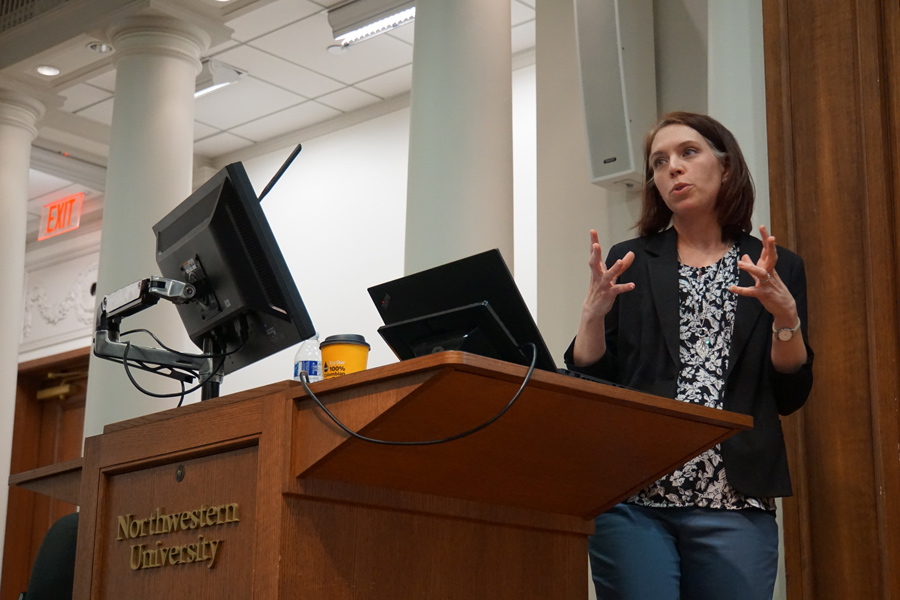Body Acceptance Week speaker and Chicago dietitian Megan Campbell talks food positivity and body acceptance
Owen Stidman/Daily Senior Staffer
Megan Campbell, a Chicago-based dietitian. She spoke Thursday to an audience in Harris Hall as part of Northwestern’s Body Acceptance Week.
February 28, 2020
Chicago-based dietitian Megan Campbell discussed how societal messaging shapes internal relationships with food and body image at a Thursday event in Harris Hall.
Northwestern University College Feminists hosted the dietician’s talk as part of Body Acceptance Week. Campbell, who specializes in treating eating disorders, spoke about what a healthier and “more intuitive” relationship with food and body can look like.
Between 10 to 20 percent of women and four to 10 percent of men in college suffer from an eating disorder, according to an estimation by the National Eating Disorders Association. Campbell’s nutrition program, Healthier Tomorrows provides individual and collaborative care to people seeking a more satisfying relationship with food and their bodies, as well as nutrition therapy for eating disorders and addiction recovery.
“Once we liberalize food — we make it all positive, we make it allowed, we take away the rules — people settle into a regular pattern of eating,” Campbell said. “It scares people, but it’s true. It’s this lack of body positivity (and) food positivity that leads to feeling (out of) control about food choices.”
Though social media usage has been correlated with body image concerns, Campbell said there is a global movement challenging the media to portray more diverse physical appearances, age, race, body shapes, sizes and abilities.
Campbell presented clips from magazines featuring “pervasive” messaging about weight loss such as “You Can’t Shake the Weight,” “30-Day Sugar Detox” and “Five Reasons You Can’t Lose the Weight.”
Online and offline messages tend to develop into disruptive internal insecurities. An example of such an internal message, she said, could be “I need to lose a few pounds to wear this” or “Once I eat a forbidden food, I’ve blown it.”
Liv Glassman, College Feminists outreach chair, said she was inspired to bring Campbell to speak on campus because she’s recently gained a strong interest in food positivity. The Communication sophomore said her experience with disordered eating was eye-opening and wanted to discuss it.
“It took me a while to get out of (disordered eating),” she said. “While I don’t think that was technically an eating disorder, it was for sure disordered eating.”
Glassman said she proposed events surrounding food and body positivity in her application for College Feminists. She said her personal connection to the issue and hearing her friends speak out about their struggles with disordered eating made her believe it was necessary to discuss this topic as a feminist issue.
SESP sophomore Tessa Volpe said she was nervous that Campbell’s talk would be a stereotypical discussion about eating healthy, but appreciated her thorough understanding of body positivity.
“From minute one, I knew that she was the type of person that I wanted to hear from on this topic,” Volpe said. “I asked a question about BMI (Body Mass Index) because so many doctors just look at your weight and say you need to lose weight due to your height, when in fact that’s not an accurate representation of health in any way.”
Email: [email protected]
Twitter: @isabellesarraf


